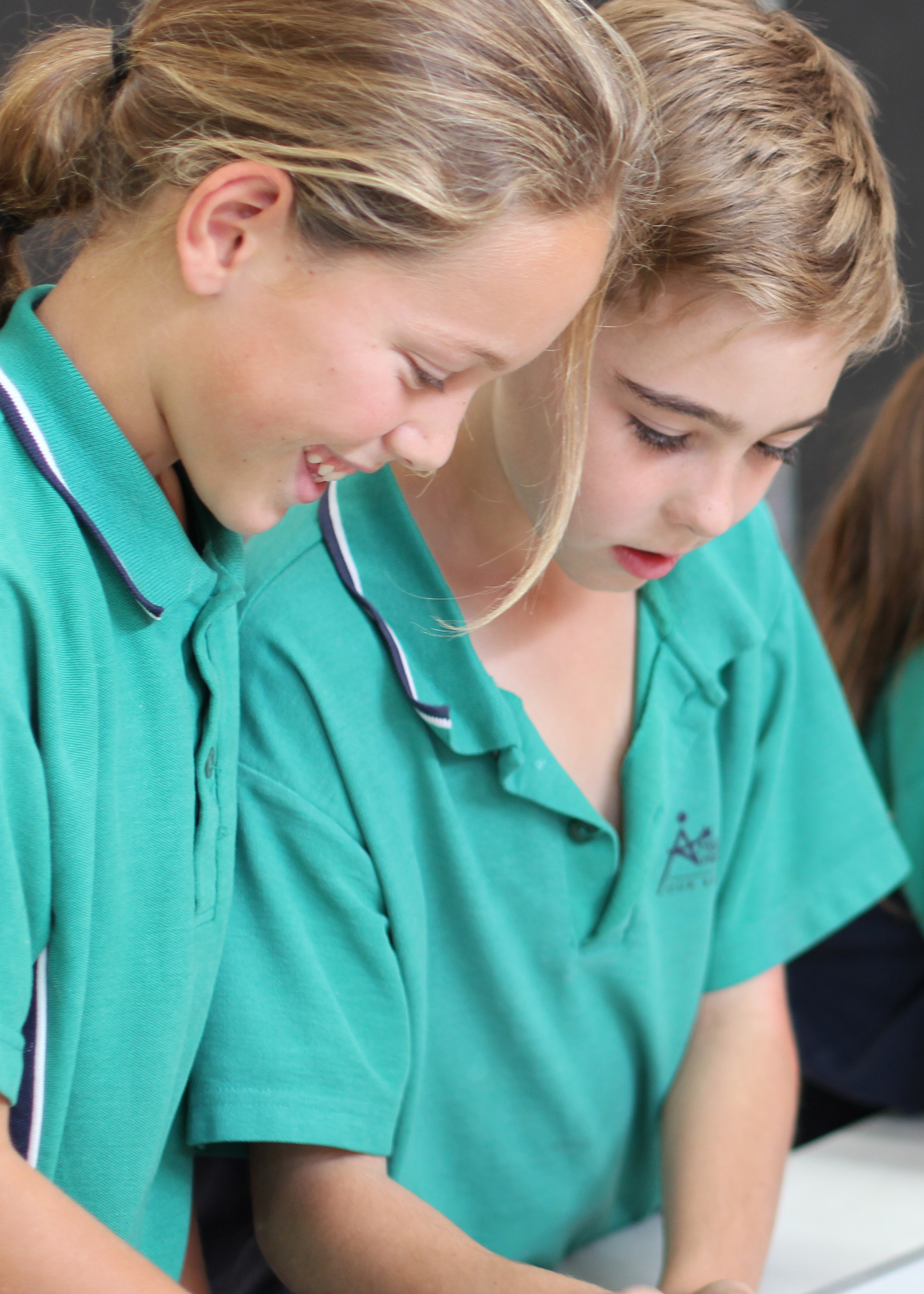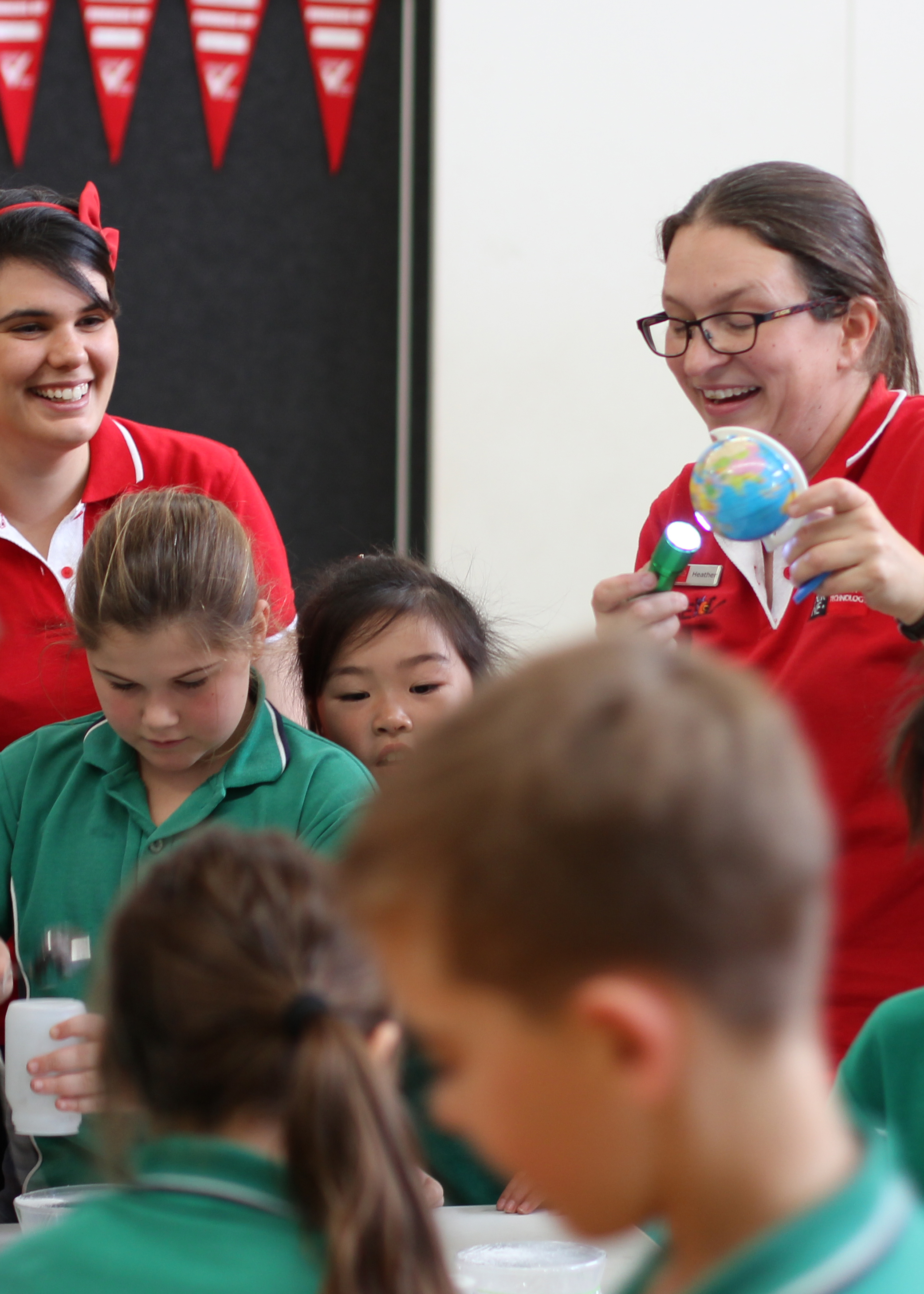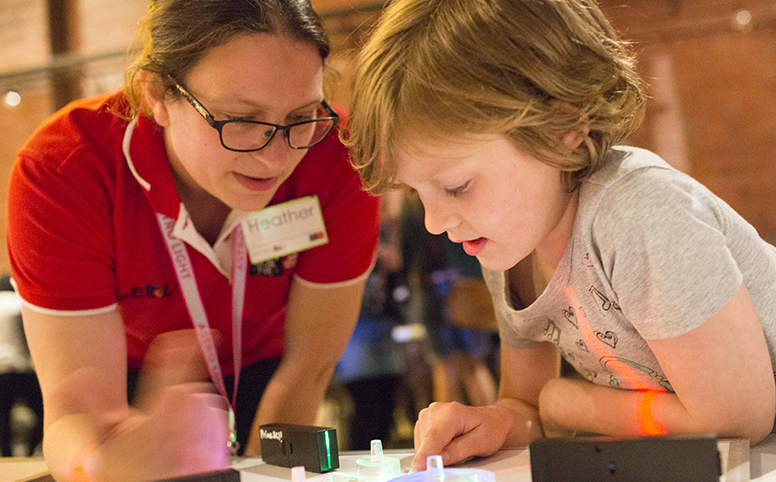At Swinburne, our PrimeSCI! School Outreach team offers interactive classroom lessons for primary schools, designed for maximum hands-on participation.
All lessons are aligned with the Victorian Curriculum across Science, Technologies, Geography and Health & PE:
Our interactive incursions are scheduled to run for 60 minutes but may be modified to suit your school timetable. The sessions include exciting demonstrations and hands-on learning activities for students.
During 2025 we will be updating our lessons to support the Victorian Science Curriculum 2.0. Check back with us for new lessons throughout the year or please email if you cannot see a topic that supports your science teaching.
The PrimeSCI! fees for hands-on science incursions (one hour) for 2025:
- $510 + GST for two sessions of the same topic (minimum)
- $255 + GST for each additional session (up to five per day)
Please note, for schools/venues further than 75kms from Swinburne Wantirna, additional travel/accommodation costs will apply.
Effective from Term 2 2026, PrimeSCI! fees for hands-on science incursions (one hour):
- $540 + GST for two sessions of the same topic (minimum)
- $270 + GST for each additional session (up to five per day)
Please note, for schools/venues further than 75kms from Swinburne Wantirna, additional travel/accommodation costs will apply.
Foundation to Year 2 incursions
Chemical sciences
Bend Stretch Twist
Learn how changing the shape and temperature in materials result in dramatic changes in their behaviour. Work with amazing materials like nappies and oobleck. Highly engaging and hands-on.
Mix and Unmix
Why do some things mix with water while others do not? How do we separate mixtures to get what we want? This delightful hands-on session will draw children into the world of chemistry and engineering as they explore the phenomena of dissolving, crystallisation and make colourful discoveries with materials.
Physical sciences
Toys in Motion
Explore forces and motion through the properties of toys. By the end of the session, students will understand the concepts of push, pull, friction and gravity. Links scientific language to familiar experiences and observations.
Sound and Light
Students learn to explain how they see and hear through hands-on activities including use of torches, prisms and mirrors. Explore how light and sound travel, bounce and move through objects.
Earth and space sciences
Our Blue Marble
Explore how Planet Earth is ideal for supporting life within our Solar System with its temperature, atmosphere and water cycle. Students learn about planet rotation and orbit, measure temperature, investigate air and make their own planet in a cup.
Earth's Resources
What do we dig up from the Earth? Students identify samples from Australian mines and work out the uses of these minerals in our everyday lives. We can’t keep digging up and chopping down Earth’s resources forever, so students work in groups to make their own recycled paper.
Biological sciences
Life Cycles
Discuss and explore what defines a living thing and identify different life stages of freshwater invertebrates in a pond water sample. Best taught in Terms 1 and 4 for greatest waterbug variety.
Secret Life of Plants
Dissect seeds, identify parts of plants and investigate germination to explore the secret world of plants. Plant your own bean seed to keep at school or take home.
Dinosaur Detectives
Become a palaeontologist and examine our special fossil collection. Make casts of real fossils and discover what we can learn from ancient teeth and claws.
Meet Mr Bones
Learn to name bones in the body, explore what makes bones strong, identify and investigate real skeletons of animals.
Digestive System
Follow food along the digestive tract and learn about how we taste, digest, and move food along our gut. Make poo to understand why it is important to eat enough vegetables. Students are given the opportunity to touch real animal tongues and stomachs!
Digital technologies
Introduction to Robotics
Robots are performing more and more tasks to help humans. Learn about communicating with robots, giving instructions and programming, as you use the Bee Bots and/or Edison Robots to complete different challenges on your classroom floor.
Edison Space Code Quest
Head into the Solar System with little Edison Robots! Learn about space research and exploration while using coding. Program the robots to complete challenges in small groups, such as taking parts to a rover or detecting precious minerals. Laptops with internet access to be provided by school. Beginners can be taught offline.

Foundation to Year 2 Science Incursions
Year 3 to 4 incursions
Chemical sciences
States of Matter
Learn about states of matter and what goes on inside different molecules. Students gain knowledge from explosions, dancing colours, links to the water cycle and peculiar oobleck.
Reinventing Plastic
Explore the world of plastics molecules and polymers, discovering the unique uses of different plastic types. Learn how to make gelatin-based bioplastic, then test out the properties of this environmentally friendly plastic. Go beyond simply looking at plastics as a waste material!
Physical sciences
Hot! Hot!
Learn what heat is, the different ways it is produced, and how heat can be transferred through cleverly designed activities and exciting demonstrations. This session covers everything your students need to know about the physics of heat.
Forces in Motion
This powerful, fast-paced session will frame students understanding of forces and how they interact. Learn the role of gravity, friction and magnetism in making objects move faster than the speed of sound.
Earth and space sciences
Our Place in Space
Learn the latest in space science as students travel into outer space to understand planetary rotations and orbits, model the gravitational effects of our Moon, and use the language of numbers to understand the wonders of our Universe.
Weather and Weathering
Learn about different types of rocks and the processes that move them around the surface of the Earth. Examine specimens from our mineral collection while investigating weathering and erosion. Explore links between Earth's water cycle and rock cycle in hands-on activities.
Biological sciences
Freshwater Habitats
Investigate different wetland water samplesto identify freshwater invertebrates. Discuss the needs of animals that live in these habitats as you learn about living and non-living factors that influence life in our local waterways. Best taught in Term 1 and 4 for greatest waterbug diversity.
Secret Life of Plants
Dissect seeds, identify parts of plants and investigate germination to explore the secret world of plants. Plant your own bean seed to keep at school or take home.
Digital technologies
Edison Space Code Quest
Head into the Solar System with little Edison Robots! Learn about space research and exploration while using coding. Program the robots to complete challenges in small groups, such as taking parts to a rover or detecting precious minerals. Laptops with internet access to be provided by school. Beginners can be taught offline.

Year 3 to 4 Science Incursions
Year 5 to 6 incursions
Chemical sciences
States of Matter
Materials around us can be grouped according to their properties. Students gain knowledge from explosions, modelling molecules, dancing colours, links to the water cycle and peculiar oobleck. It's solid, liquid and gas, plus so much more!
Physical and Chemical Change
Explore the differences between physical and chemical change through a series of exciting investigations, and learn to explain how everyday phenomena occur at the particle level.
Physical sciences
Light and Colour
Explore the magic of light as students catch, bounce, bend, split, and focus light. Students will love using the assortment of torches, mirrors, and lenses.
Electrical Circuits
This fun-filled session bridges simple curcuits to the world of complex electronics and robotics. Students learn about electricity and electrical conductivity in the context of atomic structure, and assemble simple circuits with mortors, LEDs and solar panels. At the end of the session, students apply newly acquired skills to construct machines that jiggle and dance!
Renewable Energy
Understand the physics of electricity generation, with focus on how energy is transformed to meet our needs. Use hands-on activities to explore renewable energy technologies currently used in Australia.
Earth and space sciences
Our Place in Space
Learn the latest in space science as students travel into outer space to understand planetary rotations and orbits, model the gravitational effects of our Moon, and use the language of numbers to understand the wonders of our Universe.
Natural Disasters
Explore layers within the Earth, tectonic plate movement, and the causes of natural disasters like earthquakes, volcanoes, and tsunamis. Take part in hands-on activities that teach about Earth’s mantle layer and its movement.
Biological sciences
Freshwater Habitats
Investigate different wetland water samples to identify freshwater invertebrates. Discuss the needs of animals that live in these habitats as you learn about living and non-living factors that influence life in our local waterways. Best taught in Term 1 and 4 for greatest waterbug diversity.
Our Circulatory System
Learn about how the heart works non-stop, study dissected lamb hearts, and listen to your own heart with a stethoscope. Find out about heart diseases and the medical procedures involved (real animal organs used).
Our Breathing System
Travel through our respiratory system, exploring inhalation, exhalation and investigating your own lung capacity. Understand the breathing process and how it is affected by asthma. Get close to real animal lungs as you feel this unique organ and watch it inflate!
Adapt and Survive
Discover more about the biodiversity of plants and animals using our special collection of artefacts. Use dichotomous keys to identify living things with adaptations that help them to survive in their environments. Explore genetic diversity and survival of species using a tassie devil mock-DNA case study.
Our Brains
Dissect this delicate organ and be amazed at how this jelly-like structure is responsible for the way we work, think and behave (real animal organs used).
Our Digestive System
Follow food along the digestive tract, and learn about how we taste, digest, and move food along our gut. Make poo to understand why it is important to eat enough vegetables. Touch animal tongues and stomachs (real animal organs used)!
Secret Life of Plants
Dissect seeds, identify parts of plants and investigate germination to explore the secret world of plants. Plant your own bean seed to keep at school or take home.
Digital technologies
Micro:bit Disaster Alert
Digital technology can be used to alert us to natural disasters like earthquakes and heatwaves. Use Micro:bit minicomputers to monitor and transmit information about destructive forces of nature, as simulated in your classroom. Laptops with internet access to be provided by school.
Edison Space Code Quest
Head into the Solar System with little Edison Robots! Learn about space research and exploration while using coding. Program the robots to complete challenges in small groups, such as taking parts to a rover or detecting precious minerals. Laptops with internet access to be provided by school. Beginners can be taught offline.

Year 5 to 6 Science Incursions
Digital Technologies

Swinburne PrimeSCI! Digital Technologies 2025
-

Professional learning workshops for teachers
Gain the confidence to deliver the national science curriculum through Swinburne's professional learning workshops.
Book your classroom
To book your incursions, please complete the following form.
Note: This form collects data using a third-party provider (Airtable) and you consent to this by completing the form. The data we collect is treated in accordance with Swinburne's Privacy Statement. Please be aware that the form may take a few seconds to load. If you have any queries or concerns, please email primesci@swinburne.edu.au or call +61 3 9210 1969. You can unsubscribe at any time.
More information
| Learning Areas | Science Understanding | Curriculum | PrimeSCI! incursions |
|---|---|---|---|
| Science | Chemical Sciences | Objects are made of materials that have observable properties | Bend Stretch Twist* |
| Everyday materials can be physically changed or combined with other materials in a variety of ways for a particular purpose | Bend Stretch Twist* Mix and Unmix* |
||
| Physical Sciences | The way objects move depends on a variety of factors including their size and shape: a push or a pull affects how an object moves or changes shape | Toys in Motion* | |
| Light and sound are produced by a range of sources and can be sensed | Sound and Light* | ||
| Earth and Space Sciences | Observable changes occur in the sky and landscape; daily and seasonal changes affect everyday life | Our Blue Marble* | |
| Earth's resources are used in a variety of ways | Our Blue Marble* Earth's Resources |
||
| Biological Sciences | Living things have a variety of external features and live in different places where their basic needs, including food, water and shelter, are met | Life Cycles Secret Life of Plants Dinosaur Detectives Meet Mr Bones Digestive System* |
|
| Living things grow, change and have offspring similar to themselves | Life Cycles Secret Life of Plants Dinosaur Detectives |
||
| Digital Technologies | Identify and explore digital systems (hardware and software components) for a purpose) | Introduction to Robotics Edison Space Code Quest |
|
| Follow, describe and represent a sequence of steps and decisions (algorithms) needed to solve simple problems | Introduction to Robotics Edison Space Code Quest |
*Can be run as an online session
| Learning Areas | Science Understanding | Curriculum | PrimeSCI! incursions |
|---|---|---|---|
| Science | Chemical Sciences | A change of state between solid and liquid can be caused by adding or removing heat | States of Matter* |
| Natural and processed materials have a range of physical properties; these properties can influence their use | Plastic Fantastic* |
||
| Physical Sciences | Heat can be produced in many ways and can move from one object to another; a change in the temperature of an object is related to the gain or loss of heat by the object | Hot! Hot!* | |
| Forces can be exerted by one object on another through direct contact or from a distance | Forces in Motion* | ||
| Earth and Space Sciences | Earth's rotation on its axis causes regular changes, including night and day | Our Place in Space* | |
| Earth's surface changes over time as a result of natural processes and human activity | Weather and Weathering |
||
| Biological Sciences | Living things can be grouped on the basis of observable features and can be distinguished from non-living things | Freshwater Habitats Secret Life of Plants |
|
| Different living things have different life cycles and depend on each other and the environment to survive | Freshwater Habitats Secret Life of Plants |
||
| Digital Technology | Follow, describe and represent a sequence of steps and decisions (algorithms) needed to solve simple problems | Edison Space Code Quest | |
| Develop digital solutions as simple visual program | Edison Space Code Quest |
*Can be run as an online session
| Learning Areas | Science Understanding | Curriculum | PrimeSCI! incursions |
|---|---|---|---|
| Science | Chemical Sciences | Solids, liquids and gases behave in different ways and have observable properties that help to classify them | States of Matter* |
| Changes to materials can be reversible, including melting, freezing, evaporating, or irreversible, including burning and rusting | States of Matter* Physical and Chemical Change |
||
| Physical Sciences | Light from a source forms shadows and can be absorbed, reflected and refracted | Light and Colour | |
| Energy from a variety of sources can be used to generate electricity; electric circuits enable this energy to be transferred to another place and then to be transformed into another form of energy | Electrical Circuits Renewable Energy |
||
| Earth and Space Sciences | Earth is part of a system of planets orbiting around a star (the Sun) | Our Place in Space | |
| Sudden geological changes or extreme weather conditions can affect Earth's surface | Natural Disasters Micro:bit Disaster Alert |
||
| Biological Sciences | Living things have structural features and adaptations that help them to survive in their environment | Our Digestive System* Our Circulatory System* Our Breathing System* Our Brains* Adapt and Survive |
|
| The growth and survival of living things are affected by the physical conditions of their environment | Freshwater Habitats Adapt and Survive |
||
| Digital Technologies | Investigate how forces or electrical energy can control movement, sound or light in a designed product or system | Electrical Circuits | |
| Investigate how people in design and technologies occupations address competing considerations, including sustainability, in the design of solutions for current and future use | Renewable Energy | ||
| Follow, describe and represent a sequence of steps and decisions (algorithms) needed to solve simple problems | Edison Space Code Quest Micro:bit Disaster Alert |
||
| Develop digital solutions as simple visual programs | Edison Space Code Quest Micro:bit Disaster Alert |
*Can be run as an online session
Please ensure you read our booking Terms and Conditions that apply to all incursion bookings.
Contact us
To find out more or to provide feedback on a lesson contact the PrimeSCI! Office.

